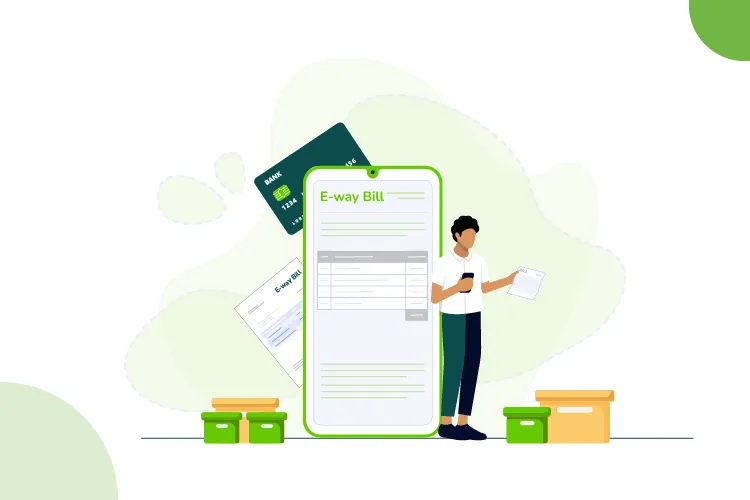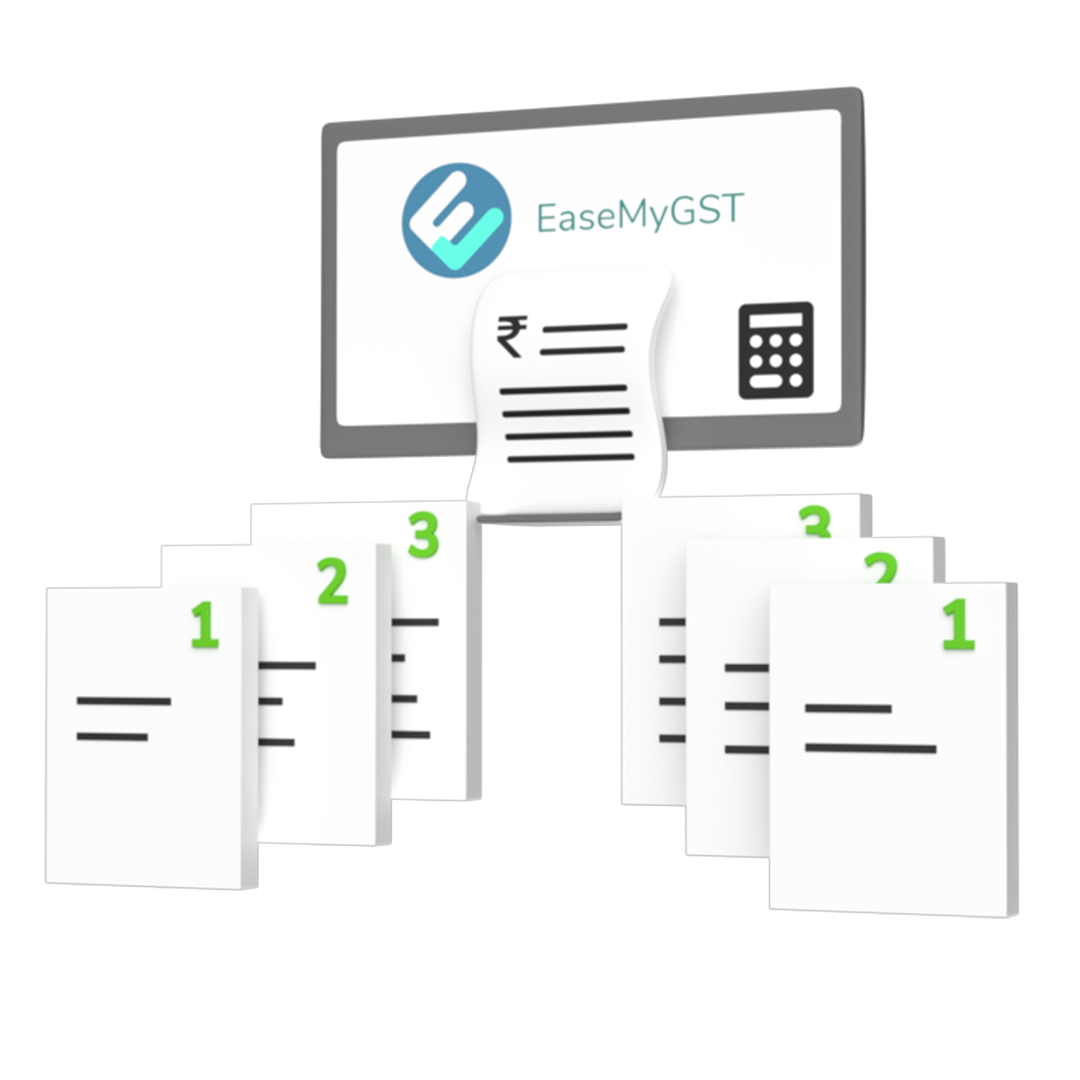The Importance of E-way Bill Automation for Online and Offline Retailers

Retailers often deal with multi-location operations, diverse supply chain partners, and fluctuating consumer demands. These complexities are compounded by the need to adhere to stringent compliance requirements like E-way bills under the Goods and Services Tax (GST) regime.
E-way bills are mandatory for the transportation of goods beyond specified thresholds. However, relying on manual processes to manage these compliance requirements can lead to significant risks. Errors, delays, and potential penalties due to non-compliance disrupt operations and affect business profitability.
In February 2024, the generation of E-way bills reached an all-time high of 9.73 crores, reflecting the increasing volume of goods movement and the critical role of compliance in logistics. Additionally, the GST Network (GSTN) has announced major updates to the E-way Bill and E-Invoice systems, set to take effect from January 2025, aimed at enhancing security and efficiency. These updates include restrictions on the generation of E-way bills for documents older than 180 days and limiting extensions to 360 days from the original date of generation.
What is an E-way Bill?
An E-way bill is an electronic document required for the movement of goods worth over a specified value as per GST norms. It serves as a compliance measure, ensuring transparency and minimizing tax evasion.
Why E-way Bills Matter
- Transparency and Compliance: E-way bills help enforce transparency in goods transportation, reducing opportunities for tax evasion. This ensures a fair and regulated business environment.
- Mandatory Scenarios: Retailers must generate E-way bills for inter-state and intra-state shipments exceeding specific monetary thresholds. Non-compliance can result in hefty penalties and delays in goods delivery.
- Impact on Retail Operations: For retailers, especially those operating across multiple states or regions, the generation and tracking of E-way bills is critical for avoiding disruptions in the supply chain.

Simplify supply chain management by integrating E-way bill automation into your ERP and OMS systems.
Manual E-way Bill Management: Why it’s So Inefficient
Relying on manual methods for E-way bill generation and management can create significant bottlenecks, which includes time-consuming processes, a heightened risk of errors, and operational inefficiencies. Manually generating E-way bills for every shipment, particularly in high-volume retail scenarios, is labor-intensive and prone to delays. Human errors in data entry or validation further increase the risk of non-compliance, potentially leading to penalties and shipment hold-ups. Additionally, manual systems lack real-time tracking capabilities, making it difficult to monitor goods in transit and causing inefficiencies in managing supply chain operations.
Benefits of E-way Bill Automation in Retail
Automation offers a comprehensive solution to the challenges posed by manual E-way bill management. Here’s how:
Speed and Efficiency
Automated systems enable rapid generation, validation, and tracking of E-way bills, significantly reducing processing times. This year, businesses reported a 30% reduction in processing times due to automation, leading to faster delivery and improved customer satisfaction.
Real-Time Compliance
Integration with GST portals ensures that E-way bills are validated in real time, minimizing the risk of penalties. Recent updates to the E-way Bill system have introduced stricter validations and real-time tracking, improving compliance accuracy and reducing errors.
Operational Efficiencies
Automation eliminates cumbersome paperwork, reduces manual intervention, and ensures faster shipment processing, improving overall logistics efficiency. A 2024 sectoral analysis revealed that automation in E-way bill management led to a 25% reduction in logistics costs for retailers.

Accelerate deliveries and reduce delays with an E-way bill solution designed for high-volume retail operations.
Optimizing Supply Chains with Integrated E-way Bill Systems
Integrated E-way bill systems can transform supply chain management for retailers with:
- Centralized Compliance Management: By integrating E-way bill systems with ERP (Enterprise Resource Planning) and OMS (Order Management System) tools, retailers can centralize and simplify compliance processes.
- Better Multi-Modal Logistics: For omnichannel retailers, automation helps optimize logistics across various transportation modes, ensuring faster delivery.
- Improved Coordination: Automated systems promote better coordination between suppliers, warehouses, and transporters, reducing delays and improving supply chain visibility.

Impact on Online Retailers
E-way bill automation has a significant impact on online retailers, particularly those managing high shipment volumes and demanding delivery timelines. Automated systems offer scalability that enables retailers to handle increased volumes during peak seasons, such as festive sales or flash promotions, without compromising compliance.
By simplifying inter-state and intra-state deliveries, automation speeds up order fulfillment, which results in faster delivery and improved customer satisfaction. Scalable automated systems further support business growth by allowing online retailers to expand into new markets while staying compliant with regulatory requirements every step of the way.

Ensure GST compliance effortlessly with advanced E-way bill automation for online and offline retailers.
The Offline Advantage: Simplifying Store Replenishment
Automated systems simplify warehouse-to-store stock transfers, minimizing delays and enabling timely, efficient inventory replenishment. Faster and more accurate restocking contributes to uninterrupted store operations, reducing the downtime associated with manual processes or delayed shipments.
Automation ensures compliance with GST regulations for both local and inter-state transportation of goods, eliminating the risk of errors and penalties. This alignment of operational efficiency with regulatory adherence empowers offline retailers to focus on growth and customer satisfaction while maintaining smooth, compliant supply chain processes.
Key Features to Look for in E-way Bill Automation Solutions
Retailers should prioritize the following features when choosing an E-way bill automation solution:
- Real-Time GST Portal Integration: Integration with GST portals allows for automatic generation and validation of E-way bills, which helps maintain compliance.
- Multi-Format Support: Solutions should support bulk uploads, APIs, and other formats to cater to diverse operational needs.
- Advanced Tracking and Reporting: Comprehensive tracking and reporting tools provide valuable insights into logistics operations, aiding in decision-making.
- User-Friendly Interface: A straightforward and intuitive interface can significantly reduce the learning curve, allowing users to quickly adapt and efficiently manage E-way bills.
- Mobile Accessibility: With enhanced mobile app capabilities introduced in 2024, users can now generate and modify E-way bills on the go, ensuring flexibility and convenience.
- Automated Alerts and Notifications: Automated systems can send real-time alerts and notifications for E-way bill expirations, discrepancies, or compliance issues, helping to avoid penalties and ensure smooth operations.
- Predictive Analytics: Leveraging artificial intelligence for predictive analytics can optimize logistics by forecasting demand and identifying potential bottlenecks.
- Customizable Workflows: Solutions that offer customizable workflows allow businesses to tailor the E-way bill process to their specific needs, improving efficiency and compliance.
Simplify E-way Bill Management with Ginesys One and EaseMyGST
Ginesys One, in collaboration with EaseMyGST, provides a robust, cloud-based solution to simplify the E-way bill generation and compliance processes. Here's how this integration transforms your operations:
Integrated E-way Bill Automation
EaseMyGST simplifies E-way bill management by automating the entire lifecycle—from generation to validation—through easy integration with ERP, POS, and OMS systems. Multichannel retailers can use the transaction software from Ginesys One itself, for example the ERP, POS and OMS to generate E-way bills for all GSTINs. EaseMyGST provides a single portal to manage multi-vehicle consignments and consolidate bills effortlessly. Automated workflows ensure data is managed state-wise or location-wise, providing precise control over logistics compliance.
Real-time Compliance and Notifications
With real-time integration into GST portals, EaseMyGST keeps your business ahead of compliance requirements. It sends instant alerts and notifications for pending invoices, cancellations, or expirations, reducing the risk of penalties. Businesses benefit from faster processing, as the system automatically reconciles mismatched invoices and prepares GST returns, including GSTR-1, 3B, and annual filings.
Operational Efficiency with Centralized Tools
EaseMyGST enhances operational efficiency by eliminating manual processes and reducing errors. It supports bulk uploads, advanced tracking, and detailed reporting features, ensuring smooth E-way bill management even during peak periods. For businesses handling high volumes of transactions, its ability to integrate with pre-built tools like Ginesys ERP and POS makes compliance management scalable and effortless.
Key Benefits of EaseMyGST:
- Time Efficiency: Automates repetitive compliance tasks, saving hours spent on manual data entry and E-way bill preparation.
- Accuracy: Reduces human errors, ensuring accurate tax calculations and compliance.
- Scalability: Accommodates growing operations with bulk actions and multi-location management.
- Security: Protects sensitive data with advanced encryption and secure cloud storage.
Ready-to-Use Integrations for Maximum Impact
EaseMyGST, the best GST software comes with pre-built connectors for Ginesys ERP, OMS and POS, allowing retailers to easily manage GST compliance, E-way bills, and E-invoices within their existing systems. The system’s ability to handle high transaction volumes and provide instant reconciliations makes it a perfect fit for online and offline retailers looking to simplify their supply chain and logistics.

Simplify GST compliance and E-way bill management with EaseMyGST.
The complexities of logistics and compliance in retail demand innovative solutions. E-way bill automation makes operations more efficient and helps retailers maintain compliance. The integration of automation into their retail ecosystems can help businesses improve coordination, and secure long-term operational success. By integrating E-way bill automation with EaseMyGST, Ginesys One empowers retailers to simplify compliance, optimize operations, and focus on delivering exceptional customer experiences.
Discover how EaseMyGST and Ginesys One can revolutionize your retail compliance and operations—schedule a demo with our team today.
